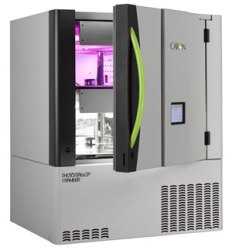Feb 11 2010
The use of light for forced degradation studies in the formulation development track of biopharmaceuticals and pharmaceuticals is a discussion point of interest for many pharmaceutical companies.
 Caron Photostability Chamber
Caron Photostability Chamber
Caron's Photostability Chambers are designed to perform light testing on drug substances and drug products as required by the FDA. These chambers feature a benchtop size and are designed for forced degradation and confirmatory studies in accordance with ICH Q1B guidelines, making them ideal for biopharmaceutical and pharmaceutical testing.
"The pharmaceutical market has embraced the Caron 6540 series of Photostability Chambers as the benchmark for ICH Q1B testing," said Bob Dotterer, applications engineer.
Caron manufactures two different 10 cu. ft. Photostability Chambers. The 6540 Photostability series controls light and temperature conditions. The 6545 series precisely controls light, temperature and humidity. These chambers have an easy to use color touch screen interface.
Photostability Chambers have independent control of near UV and cool white lamps and allow testing to exact required confirmatory exposure levels. Caron's technology provides uniform UVA and VIS light reflection and maintains proper spectral power distribution.
These chambers have programmable alarms. Dimmable lights come standard on the 230V models.